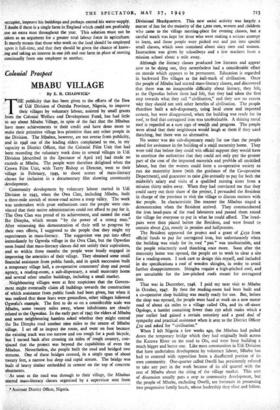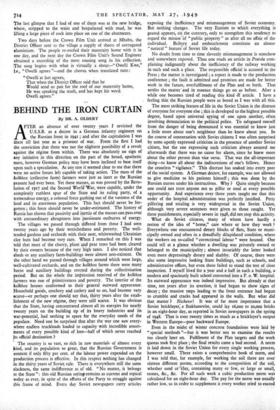Colonial Prospect
MBABU VILLAGE
By E. R. CHADWICK*
THE publicity that has been given to the efforts of the Ibos of Udi Division of Onitsha Province, Nigeria, to improve
their villages by voluntary labour, assisted by small grants from the Colonial Welfare and Development Fund, has had little to say about Mbabu Village, in spite of the fact that the Mbabus have more achievements to their credit and have done more to make their primitive village less primitive than any other people in the Division. The Mbabus, however, are not averse from publicity, and in 1948 one of the leading elders complained to me, in my capacity as District Officer, that the Colonial Film Unit that had been recording the voluntary work done in several villages in Udi Division [described in the Spectator of April 1st] had made no records at Mbabu. The people were therefore delighted when the Crown Film Unit, with Terry Bishop as Director, went to their village in February, 1949, to shoot scenes of mass-literacy classes for inclusion in a documentary film showing community development.
Community development by voluntary labour started in Udi Division in 1943, when the Ova Clan, including Mbabu, built a three-mile stretch of motor-road across a steep valley. The work was undertaken with great enthusiasm once the people were con- vinced that their native administration could not afford to pay for it. The Owa Clan was proud of its achievement, and named the road Ike Dimpka, which means " by the power of a strong man." After witnessing this demonstration of their will to progress by their own efforts, I suggested to the people that they might try experiments in mass-literacy. The suggestion was put into effect immediately by Ogwofia village in the Owa Clan, but the Ogwofias soon found that mass-literacy classes did not satisfy their aspirations, and so within three months the people were busily engaged in improving the amenities of their village. They obtained some small financial assistance from public funds, and in quick succession built a temporary village hall, a co-operative consumers' shop and postal agency, a reading-room, a sub-dispensary, a small maternity home and several other smaller buildings, including a small market.
Neighbouring villages were at first suspicious that the Govern- ment might eventually claim all buildings towards the construction of which assistance from public funds had been given, but when it was realised that these fears were groundless, other villages followed Ogwofia's example. The first to do so on a considerable scale was Mbabu, some twenty miles away, whose inhabitants are closely related to the Ogwofias. In the early part of 1945 the elders of Mbabu and some neighbouring hamlets asked whether they might extend the Ike Dimpka road another nine miles to the centre of Mbabu village. I set off to inspect the route, and went on foot because the existing track was too narrow and too rough for a push bicycle, but I turned back after crossing six miles of rough country, con- vinced that the project was beyond the capabilities of even the Mbabus. Nevertheless, the people built the road and bridged two streams. One of these bridges crossed, in a single span of about twenty feet, a narrow but deep and rapid stream. The bridge was built of heavy timber embedded in cement on the top of concrete abutments.
As soon as the road was through to their village, the Mbabus started mass-literacy classes organised by a supervisor sent from * Assistant District Officer, Nigeria. Divisional Headquarters. This new social activity was largely a matter of fun for the majority of the t,zoo men, women and children who came to the village meeting-place for evening classes, but a careful watch was kept for those who were making a serious attempt to learn, and those people were picked out and put into special small classes, which soon contained about sixty men and women. Instruction was given by schoolboys and a few teachers from a mission school about a mile away.
Although the literacy classes produced few literates and appear now to be dying out, they nevertheless had a considerable eff&t on morale which appears to be permanent. Education is regarded in backward Ibo villages as the hall-mark of civilisation. Once the people of Mbabu had started mass-literacy classes, and discovered that there was no insuperable difficulty about literacy, they felt, as the Ogwofias before them had felt, that they had taken the first step towards what they call " civilisation," and they saw no reason why they should not seek other benefits of civilisation. The people therefore built a sub-dispensary, using local stone and imported cement, but were disappointed, when the building was ready for its roof, to find that corrugated iron was unobtainable. A shining metal roof is regarded as a sure sign of wealth and progress. The people were afraid that their neighbours would laugh at them if they used thatching, but there was no alternative.
No sooner was the sub-dispensary ready for use than the people asked for assistance in the building of a small maternity home. They were told that before they could win official support they would have to convince the authorities that they could not only pay the greater part of the cost of the imported materials and protride all unskilled labour, but that the women could form a co-operative society to run the maternity home (with the guidance of the Co-operative Department), and guarantee to raise Loa annually to pay for both the midwife's salary and visits of a qualified nursing sister from a mission thirty miles away. When they had convinced me that they could carry out their share of the project, I persuaded the Resident in charge of the province to visit the village to discuss matters with the people. In characteristic Ibo manner the Mbabus staged a demonstration when the Resident arrived. They commandeered the iron head-pans of the road labourers and passed them round the village for everyone to put in what he could afford. The head- pans were then placed before the Resident, and were found to contain about kjo, mostly in pennies and halfpennies.
The Resident approved the project and a grant of Liso from official funds to pay for corrugated iron, but unfortunately when
the building was ready for its roof " pan" was unobtainable, and the people reluctantly used thatching once more. Soon after the maternity home was opened, the people set to work to clear a site for a reading-room. I took care to design this myself, and included in the specifications a roof of wooden shingles, in order to avoid further disappointments. Shingles require a high-pitched roof, and are unsuitable for the low-pitched roofs meant for corrugated iron.
That was in December, 1946. I paid my next visit to Mbabu in October, 1947. By then the reading-room had been built and a co-operative shop building was nearly ready for use. But, before the shop was opened, the people were hard at work on a new motor road of about six miles to a village called Olo, and its off-shoot Ogologo, a hamlet containing fewer than 250 adult males which a year earlier had gained a certain notoriety and a good deal of sympathy and practical assistance when it sent to the District Officer Lio and asked for "civilisation."
When I left Nigeria a few weeks ago, the Mbabus had pulled down the temporary bridge which they had originally built across the Karawa River on the road to Olo, and were busy building a much bigger and better one. Like most communities in Udi Division that have undertaken development by voluntary labour, Mbabu has had to contend with opposition from a disaffected portion of its own community. One-quarter called Owelli has persistently refused to take any part in the work because of its old quarrel with the rest of Mbabu about the siting of the village market. This sort of dissension usually puts a stop to community development, but the people of Mbabu, excluding Owelli, are fortunate in possessing two progressive family heads, whose leadership they trust and follow. The last glimpse that I had of one of them was at the new bridge, Where, stripped to the waist and bespattered with mud, he was lifting a large piece of rock into place on one of the abutments.
Two days before the Crown Film Unit arrived at Mbabu, the District Officer sent to the village a supply of sheets of corrugated aluminium. The people re-roofed their maternity home with it in one day, and the next day the Crown Film Unit's Sound Engineer obtained a recording of the most rousing song in his collection. The song begins with what is virtually a shout—" Owelli Kwe," i.e., " Owelli agrees "—and the chorus when translated runs : " Owelli at last agrees, That when the District Officer said that he Would send us pan for the roof of our maternity home, He was speaking the truth, and has kept his word. Owelli agrees."







































 Previous page
Previous page